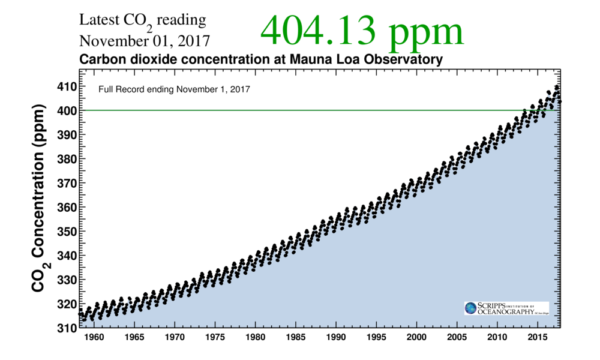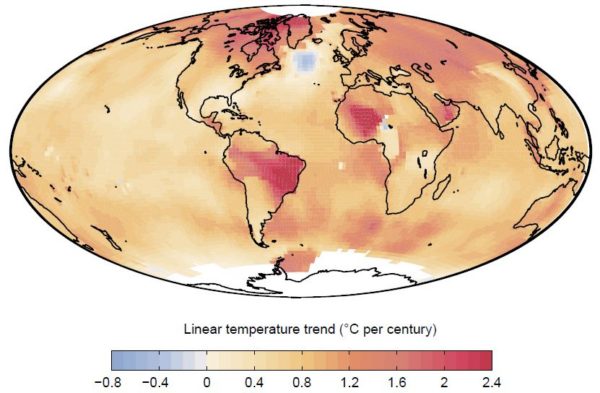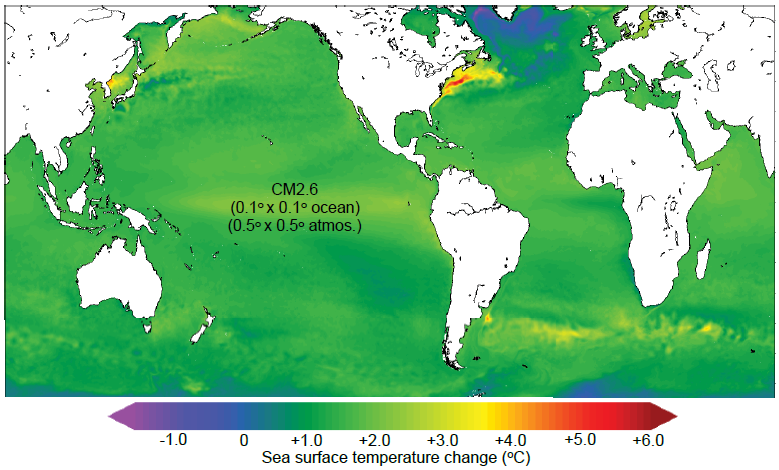A few weeks ago, we’ve argued in a paper in Nature that the Atlantic overturning circulation (sometimes popularly dubbed the Gulf Stream System) has weakened significantly since the late 19th Century, with most of the decline happening since the mid-20th Century. We have since received much praise for our study from colleagues around the world (thanks for that). But there were also some questions and criticisms in the media, so I’d like to present a forum here for discussing these questions and hope that others (particularly those with a different view) will weigh in in the comments section below. [Read more…] about If you doubt that the AMOC has weakened, read this
Oceans
Stronger evidence for a weaker Atlantic overturning circulation
Through two new studies in Nature, the weakening of the Gulf Stream System is back in the scientific headlines. But even before that, interesting new papers have been published – high time for an update on this topic.
Let’s start with tomorrow’s issue of Nature, which besides the two new studies (one of which I was involved in) also includes a News&Views commentary. Everything revolves around the question of whether the Gulf Stream System has already weakened. Climate models predict this will be one consequence of global warming – alongside other problems such as rising sea levels and increasing heat waves, droughts and extreme precipitation. But is such a slowdown already underway today? This question is easier asked than answered. The Atlantic Meridional Overturning Circulation (AMOC, also known as Gulf Stream System) is a huge, three-dimensional flow system throughout the Atlantic, which fluctuates on different time scales. It is therefore by no means enough to put a current meter in the water at one or two points. [Read more…] about Stronger evidence for a weaker Atlantic overturning circulation
The global CO2 rise: the facts, Exxon and the favorite denial tricks
The basic facts about the global increase of CO2 in our atmosphere are clear and established beyond reasonable doubt. Nevertheless, I’ve recently seen some of the old myths peddled by “climate skeptics” pop up again. Are the forests responsible for the CO2 increase? Or volcanoes? Or perhaps the oceans?
Let’s start with a brief overview of the most important data and facts about the increase in the carbon dioxide concentration in the atmosphere:
- Since the beginning of industrialization, the CO2 concentration has risen from 280 ppm (the value of the previous millennia of the Holocene) to now 405 ppm.
- This increase by 45 percent (or 125 ppm) is completely caused by humans.
- The CO2 concentration is thus now already higher than it has been for several million years.
- The additional 125 ppm CO2 have a heating effect of 2 watts per square meter of earth surface, due to the well-known greenhouse effect – enough to raise the global temperature by around 1°C until the present.

Fig. 1 Perhaps the most important scientific measurement series of the 20th century: the CO2 concentration of the atmosphere, measured on Mauna Loa in Hawaii. Other stations of the global CO2 measurement network show almost exactly the same; the most important regional variation is the greatly subdued seasonal cycle at stations in the southern hemisphere. This seasonal variation is mainly due to the “inhaling and exhaling” of the forests over the year on the land masses of the northern hemisphere. Source (updated daily): Scripps Institution of Oceanography. [Read more…] about The global CO2 rise: the facts, Exxon and the favorite denial tricks
Snow Water Ice and Water and Adaptive Actions for a Changing Arctic
The Arctic is changing fast, and the Arctic Council recently commissioned the Arctic Monitoring and Assessment Programme (AMAP) to write two new reports on the state of the Arctic cryosphere (snow, water, and ice) and how the people and the ecosystems in the Arctic can live with these changes.
The two reports have now just been published and are called Snow Water Ice and Permafrost in the Arctic Update (SWIPA-update) and Adaptive Actions for a Changing Arctic (AACA).
[Read more…] about Snow Water Ice and Water and Adaptive Actions for a Changing Arctic
There was no pause
I think that the idea of a pause in the global warming has been a red herring ever since it was suggested, and we have commented on this several times here on RC: On how data gaps in some regions (eg. the Arctic) may explain an underestimation of the recent warming. We have also explained how natural oscillations may give the impression of a faux pause. Now, when we know the the global mean temperature for 2016, it’s even more obvious.
Easterling and Wehner (2009) explained that it is not surprising to see some brief periods with an apparent decrease in a temperature record that increases in jumps and spurts, and Foster and Rahmstorf (2012) showed in a later paper how temperature data from the most important observations show consistent global warming trends when known short-term influences such as El Niño Southern oscillation (ENSO), volcanic aerosols and solar variability are accounted for.
A recent paper by Hausfather et al. (2017) adds little new to our understanding, although it confirms that there has not been a recent “hiatus” in the global warming. However, if there are doubts about a physical condition, then further scientific research is our best option for establishing the facts. This is exactly what this recent study did.
The latest findings confirm the results of Karl et al. 2015 from the National Oceanic Atmospheric Administration (NOAA), which Gavin described in a previous post here on RC. The NOAA analysis received unusual attention because of the harassment it drew from the chair of the US House Science Committee and the subpoena demand for emails.
[Read more…] about There was no pause
References
- D.R. Easterling, and M.F. Wehner, "Is the climate warming or cooling?", Geophysical Research Letters, vol. 36, 2009. http://dx.doi.org/10.1029/2009GL037810
- G. Foster, and S. Rahmstorf, "Global temperature evolution 1979–2010", Environmental Research Letters, vol. 6, pp. 044022, 2011. http://dx.doi.org/10.1088/1748-9326/6/4/044022
- Z. Hausfather, K. Cowtan, D.C. Clarke, P. Jacobs, M. Richardson, and R. Rohde, "Assessing recent warming using instrumentally homogeneous sea surface temperature records", Science Advances, vol. 3, 2017. http://dx.doi.org/10.1126/sciadv.1601207
- T.R. Karl, A. Arguez, B. Huang, J.H. Lawrimore, J.R. McMahon, M.J. Menne, T.C. Peterson, R.S. Vose, and H. Zhang, "Possible artifacts of data biases in the recent global surface warming hiatus", Science, vol. 348, pp. 1469-1472, 2015. http://dx.doi.org/10.1126/science.aaa5632
The underestimated danger of a breakdown of the Gulf Stream System
A new model simulation of the Gulf Stream System shows a breakdown of the gigantic overturning circulating in the Atlantic after a CO2 doubling.
A new study in Science Advances by Wei Liu and colleagues at the Scripps Institution of Oceanography in San Diego and the University of Wisconsin-Madison has important implications for the future stability of the overturning circulation in the Atlantic Ocean. They applied a correction to the freshwater fluxes in the Atlantic, in order to better reproduce the salt concentration of ocean waters there. This correction changes the overall salt budget for the Atlantic, also changing the stability of the model’s ocean circulation in future climate change. The Atlantic ocean circulation is relatively stable in the uncorrected model, only declining by about 20% in response to a CO2 doubling, but in the corrected model version it breaks down completely in the centuries following a CO2 doubling, with dramatic consequences for the climate of the Northern Hemisphere. [Read more…] about The underestimated danger of a breakdown of the Gulf Stream System
A trigger action from sea-level rise?
Can a rising sea level can act as a boost for glaciers calving into the sea and trigger a surge of ice into the oceans? I finally got round to watch the documentary Chasing Ice over the Christmas and New Year’s break, and it made a big impression. I also was left with this question after watching it.
Q & A about the Gulf Stream System slowdown and the Atlantic ‘cold blob’
Last weekend, in Reykjavik the Arctic Circle Assembly was held, the large annual conference on all aspects of the Arctic. A topic of this year was: What’s going on in the North Atlantic? This referred to the conspicuous ‘cold blob’ in the subpolar Atlantic, on which there were lectures and a panel discussion (Reykjavik University had invited me to give one of the talks). Here I want to provide a brief overview of the issues discussed.
What is the ‘cold blob’?
This refers to exceptionally cold water in the subpolar Atlantic south of Greenland. In our paper last year we have shown it like this (see also our RealClimate post about it):

Fig. 1 Linear temperature trends from 1901 to 2013 according to NASA data. Source: Rahmstorf et al, Nature Climate Change 2015.
[Read more…] about Q & A about the Gulf Stream System slowdown and the Atlantic ‘cold blob’
The Snyder Sensitivity Situation
Nature published a great new reconstruction of global temperatures over the past 2 million years today. Snyder (2016) uses 61 temperature reconstructions from 59 globally diverse sediment cores and a correlation structure from model simulations of the last glacial maximum to estimate (with uncertainties) the history of global temperature back through the last few dozen ice ages cycles. There are multiple real things to discuss about this – the methodology, the relatively small number of cores being used (compared to what could have been analyzed), the age modeling etc. – and many interesting applications – constraints on polar amplification, the mid-Pleistocene transition, the duration and nature of previous interglacials – but unfortunately, the bulk of the attention will be paid to a specific (erroneous) claim about Earth System Sensitivity (ESS) that made it into the abstract and was the lead conclusion in the press release.
The paper claims that ESS is ~9ºC and that this implies that the long term committed warming from today’s CO2 levels is a further 3-7ºC. This is simply wrong.
[Read more…] about The Snyder Sensitivity Situation
References
- C.W. Snyder, "Evolution of global temperature over the past two million years", Nature, vol. 538, pp. 226-228, 2016. http://dx.doi.org/10.1038/nature19798
AMOC slowdown: Connecting the dots
I want to revisit a fascinating study that recently came from (mainly) the Geophysical Fluid Dynamics Lab in Princeton. It looks at the response of the Atlantic Ocean circulation to global warming, in the highest model resolution that I have seen so far. That is in the CM2.6 coupled climate model, with 0.1° x 0.1° degrees ocean resolution, roughly 10km x 10km. Here is a really cool animation.
When this model is run with a standard, idealised global warming scenario you get the following result for global sea surface temperature changes.

Fig. 1. Sea surface temperature change after doubling of atmospheric CO2 concentration in a scenario where CO2 increases by 1% every year. From Saba et al. 2016.